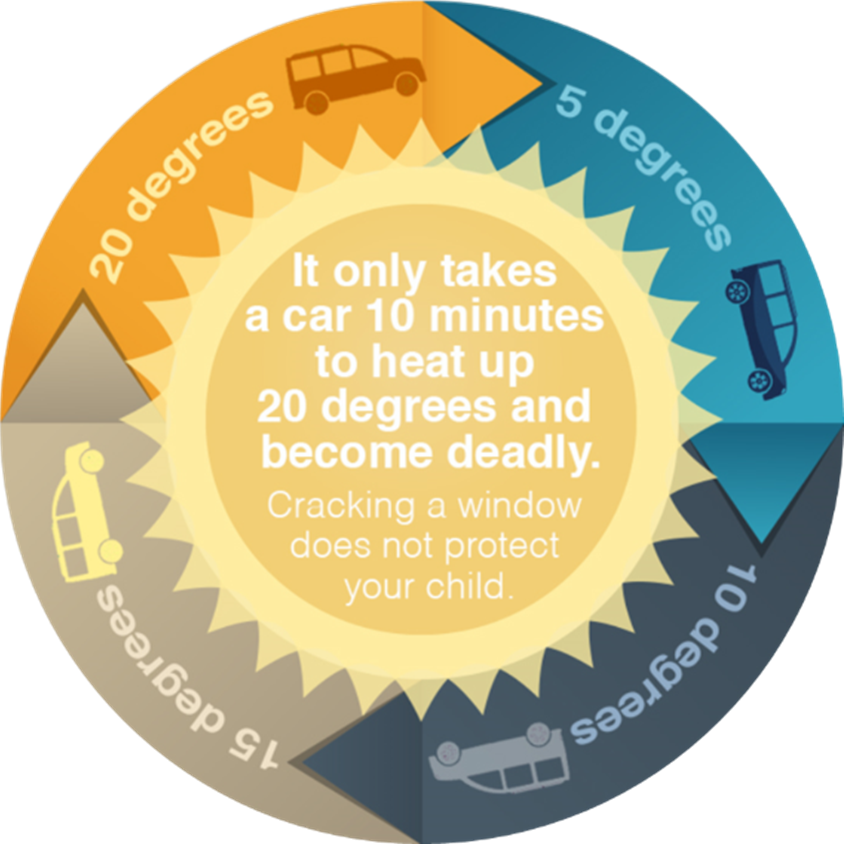Leaving Children Alone in Hot Cars — Know the Risks and Consequences

As outside temperatures rise, the danger for children being seriously injured or even dying from being left alone inside a hot car rises. Heatstroke is the leading cause of non-traffic, non crash related fatalities for children 14 years of age and younger. Heatstroke begins when the core body temperature reaches about 104 degrees and the ability to maintain or control body temperature is overwhelmed. Children and Hot Cars are a Deadly Combination! Children are at higher risk of dying in a hot vehicle than adults, especially when they are too young to alert others for help.
Vehicles heat up quickly – even with a window rolled down two inches, if the outside temperature is in the low 80°s Fahrenheit, the temperature inside a vehicle can reach deadly levels in only 10 minutes. Children’s bodies overheat easily, and infants and children under four years of age are among those at greatest risk for heat-related illness.
Children’s bodies absorb more heat on a hot day than an adult. Also, children are less able to lower their body heat by sweating. When a body cannot sweat enough, the body temperature rises rapidly. In fact, when left in a hot vehicle, a young child’s body temperature may increase three to five times as fast an adult. High body temperatures can cause permanent injury or even death.
Risks
It can happen to anyone:
- In 52.6% of cases, the child was forgotten by the caregiver.
- In 25.9% of cases, children got into the vehicle on their own.
- The children most at-risk are those under 1-year, making up 31% of heatstroke deaths.
Prevent Vehicle-Related Heatstroke

- In 10 minutes, a car can heat up 20 degrees Fahrenheit.
- Cracking a window does little to keep the car cool.
- With temperatures in the 60s, your car can heat up to well above 110 degrees.
- A child’s body temperature can rise up to five times faster than an adult’s body temperature.
- Heatstroke can happen when the temperature is as low as 57 degrees outside!
- A child dies when his/her temperature reaches 107 degrees.
Warning signs of heatstroke include:

- Red, hot, and moist or dry skin
- No sweating, even though the child is warm
- Strong rapid pulse or slow weak pulse
- Throbbing headache
- Dizziness
- Nausea
- Confusion, or acting strangely
If a child exhibits any of these signs after being in a hot vehicle, cool the child rapidly. Do Not place child in an ice bath but by spraying the child with cool water.
Take Action: Call 911 or your local emergency number immediately.
Prevention is based on remembering three things:
- NEVER leave a child in a vehicle unattended.
- EVERY TIME you exit the vehicle, look in the back seat.
- ALWAYS lock the car and put the keys out of reach of children.
Prevention Tips to Avoid a Tragic Heatstroke

- ALWAYS LOOK BEFORE YOU LOCK!
- Always check the back seat before you lock the vehicle and walk away.
- Get in the habit of always opening the back door to check the back seat before leaving a vehicle. Put something you will need like your cell phone , handbag, or briefcase, etc., in the back seat to create a reminder to open the back door to retrieve that item every time you park.
- Keep a large stuffed animal in the child’s car seat. When the child is placed in the car seat, put the stuffed animal in the front passenger seat as a visual reminder that the child is in the back seat.
- Distractions and/or a change in routine increase the risk of forgetting a child in a back seat. If someone else is driving your child, or your daily routine is altered, always check to make sure your child has arrived safely.
- Have a strict policy in place with the childcare provider about morning drop-off.
- If your child will not be attending childcare as scheduled, the parent’s responsibility is to call and inform the childcare provider.
- If the child does not show up as scheduled, and the child care provider did not receive a call, the childcare provider pledges to contact the parent immediately to ensure the safety of your child.
- Never leave a child alone in a car.
- Never let children play in an unattended vehicle. Teach children that a vehicle is not a play area.
- Never leave a child in a parked vehicle, even if the windows are partially open.
- Observe and Report: If you see a child alone in a car, call 911, especially on warm days!
